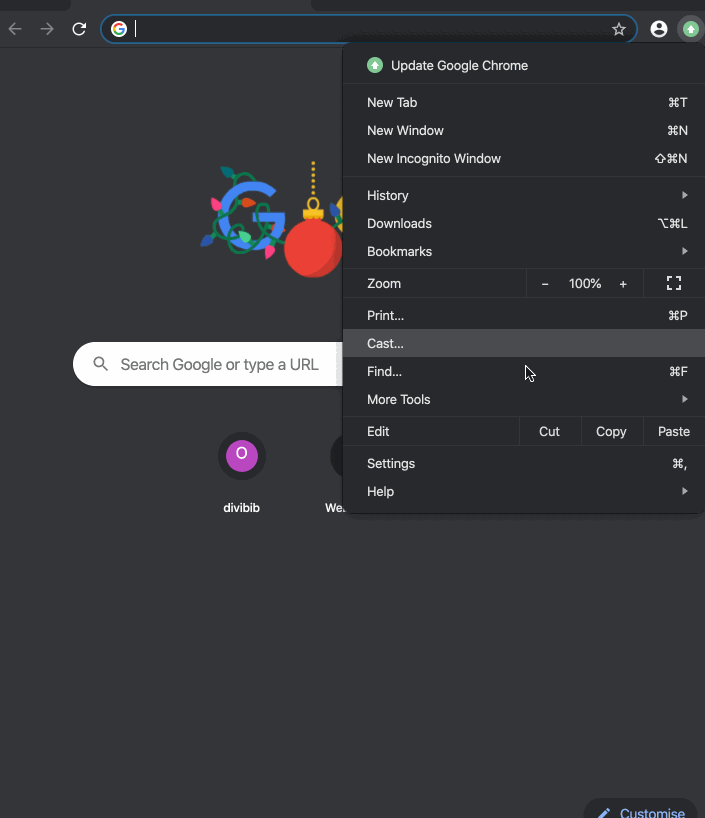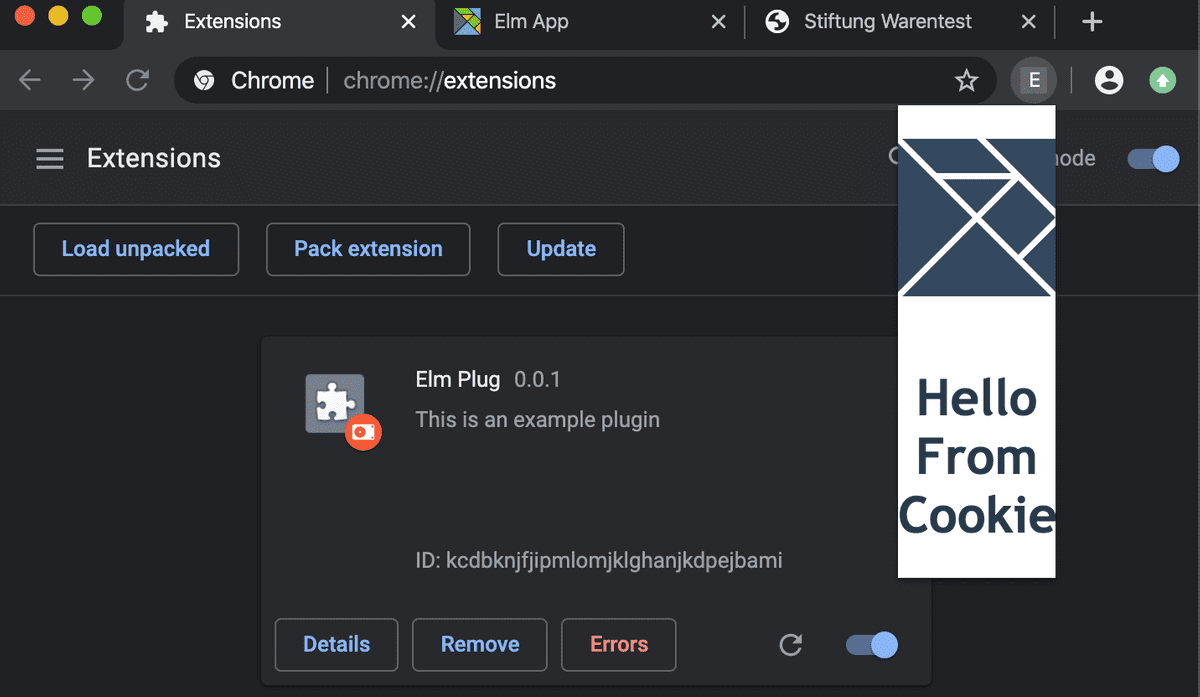Writing a Chrome Plugin with Elm
Recently I had the need to write a small browser plugin for one of my projects, the thought of that already making me feel bad thinking of needing to program in Javascript again 😱. But then my fear turned to joy, when I realized this is a perfect opportunity to write the plugin in Elm, my favorite language for the frontend. Elm is a beautiful language, with a similar feel to Haskell, it gives some benefits as:
- No Runtime Exceptions
- Great Performance
- Functional to its core
- Great Error Messages / Compiler
- The Elm Architecture
Check out a nice introduction here:
You can find the whole code for this example here: https://github.com/yannick-cw/elm-example-chrome-plugin
Setting up the project
We will create the Elm project with create-elm-app, as it makes developing pretty comfortable and easy.
Run create-elm-app elm-plug and cd elm-plug afterwards. To verify all is working run elm-app start and you should see your elm app running on http://localhost:3000.
You should have a structure like that now:
elm-plug
│ README.md
│ elm.json
│ .gitignore
│
└───public
│
└───src
│
└───testsNow are able to run elm-app build, which generates the production build for us in build/ and build/static/.
Setup for the Plugin
Next we need to add a manifest.json file under public/manifiest.json. There is already one in there, but we replace it with a new, as we need a different setup for using our app as a plugin.
{
"manifest_version": 2,
"name": "Elm Plug",
"description": "This is an example plugin",
"version": "0.0.1",
"browser_action": {
"default_popup": "index.html"
},
"permissions": ["cookies", "http://www.test.de/"]
}One important part here is to tell the browser which file to load initially with browser_action.default_popup and to get permission, if you want to access anything from the Extensions Api. As we want to read some cookies later, we can already add that here. We also add an url to specify which hosts we can access, e.g. read cookies from.
Next it's time to add our plugin to the browser and see it in action.
Enabling the Plugin
We have to run elm-app build again, to build with our new manifest.json and have the build directory ready.
Now we need to load the build directory as an unpacked chrome plugin, as shown in the gif:

Great now we already have our Elm application running as a plugin. What else do we need? Access to the Extensions Api would be great, to interact with the browser outside of the plugin.
Using Ports to access the Plugin API
To access anything outside of our save Elm world, we need to use Ports, they are our way how to interact asynchronously with JS. There is no synchronous way to directly interact with anything from the outside, as this could risk our no runtime exceptions guarantees. I will not go into detail here how ports work, check the nice docs for more information.
We need to create a new file Ports.elm:
port module Ports exposing (askCookie, updateCookie, CookieValue)
type alias CookieValue =
String
type alias CookieName =
String
port updateCookie : (Maybe CookieValue -> msg) -> Sub msg
port askCookie : CookieName -> Cmd msgImportant here is to add the port in front of the module declaration.
We added two functions here, the askCookie can be used to send something to the outside world and updateCookie can be used to receive something from the outside world.
What askCookie does not do, is returning a resulting CookieValue in any way. It is just an asynchronous message to the outside, triggering some action.
As we can never rely on the JS code from outside, we can only ever expect to Maybe receive an CookieValue. To use updateCookie we need to provide a function that creates a message from the CookieValue we get back.
Lets use our ports in out Main.elm:
We add import Ports exposing (askCookie, updateCookie, CookieValue) to the imports and send the askCookie event when the plugin is opened:
type alias Model =
Maybe CookieValue
init : ( Model, Cmd Msg )
init =
( Nothing, askCookie "some_cookie" )Next we need to make sure we listen to the cookies coming in through updateCookie:
For that we add a new Msg, fulfilling exactly the parameter of our updateCookie function (Maybe CookieValye -> msg).
type Msg
= GotCookie (Maybe CookieValue)Than we add a subscription to updateCookie:
main : Program () Model Msg
main =
Browser.element
{ view = view
, init = \_ -> init
, update = update
, subscriptions = \_ -> updateCookie GotCookie -- listen to updates
}And finally react to received updates of the cookie:
update : Msg -> Model -> ( Model, Cmd Msg )
update msg model =
case msg of
GotCookie maybeCookie ->
( maybeCookie, Cmd.none )Now we can display the cookie value:
view : Model -> Html Msg
view model =
let
cookieText =
case model of
Just c ->
text c
Nothing ->
text "Did not get any cookie"
in
div []
[ img [ src "/logo.svg" ] []
, h1 [] [ cookieText ]
]Lastly we need to add some javascript to actually read the cookie from the browser. Therefore we change the src/index.js file:
import './main.css'
import { Elm } from './Main.elm'
import * as serviceWorker from './serviceWorker'
const app = Elm.Main.init({
node: document.getElementById('root')
})
const updateCookie = cookieName => {
if (chrome && chrome.cookies) {
chrome.cookies.get(
{ url: 'https://www.test.de/', name: cookieName },
function(cookie) {
if (cookie) {
app.ports.updateCookie.send(cookie.value)
} else {
app.ports.updateCookie.send(null)
}
}
)
}
}
app.ports.askCookie.subscribe(updateCookie)
// If you want your app to work offline and load faster, you can change
// unregister() to register() below. Note this comes with some pitfalls.
// Learn more about service workers: https://bit.ly/CRA-PWA
serviceWorker.unregister()This subscribes to the askCookie messages and runs the updateCookie function, whenever there is a new message from aksCookie.
In the updateCookie function we try to access the cookies for www.test.de and the given name. This cookie we send asynchronously back to our Elm App with updateCookie.send. If we send null, in the case that we do not find a cookie, we will receive Nothing inside our Elm App.
If you now have a cookie set for www.test.de with the name "some_cookie" this should now show up, when you open the plugin.
Mock for Dev
One last thing, to make development easier and faster, is to mock the chrome.cookies access, so you can see the Elm App behaviour without running elm-app build every time you haven changes. E.g. add this to the index.js:
const updateCookie = cookieName => {
if (chrome && chrome.cookies) {
chrome.cookies.get(
{ url: 'https://www.test.de/', name: cookieName },
function(cookie) {
if (cookie) {
app.ports.updateCookie.send(cookie.value)
} else {
app.ports.updateCookie.send(null)
}
}
)
} else {
app.ports.updateCookie.send('dev_cookie')
}
}Now you can just develop with having elm-app start running and inspecting the page in the browser directly, instead of only in the plugin window.
Thats all to get started building plugins with Elm.


